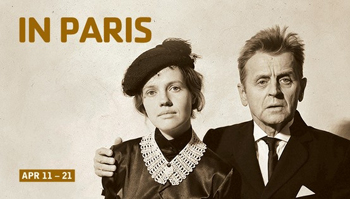UNFETTERED AND ALIVE
In Paris, Dmitry Krymov’s adaptation of an Ivan Bunin story, traces in words, music, and movement a few moments in the lives of two Russian émigrés (Anna Sinyakina and Mikhail Baryshnikov) after the Russian Revolution. Living static lives of alienated poverty, the young waitress and the old general meet and begin a romance that alters everything and nothing in their world, the lonely underbelly of Paris. It’s a familiar 20th Century backdrop, the formerly privileged in desperate exile, explored by diaspora writers from Bunin to Nabokov and given new resonance in this delicate, beautifully imagined play.
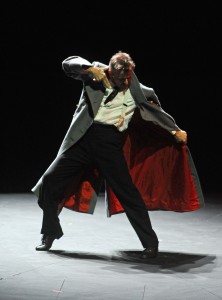 A dancer dances (choreography by Alexei Ratmansky); singers sing (Bizet as well as original work by Dmitry Volkov); and an ensemble of graceful musician/actors transforms empty black space into a universe of visual, harmonic information (Maxim Maminov, Maria Gulik, Polina Butko, Ossi Makkonen, Lasse Lindberg). A love story plays out as hopeful and tragic as every love story ever told. There are sight gags and existential soliloquies. Someone flies, and a man shaves for several riveting minutes. All of it matters, all of it furthers the point; the text of this play barely covers nine pages, and yet these 80 minutes are full of intellectual action and life, the kind of life for which we attend the theater.
A dancer dances (choreography by Alexei Ratmansky); singers sing (Bizet as well as original work by Dmitry Volkov); and an ensemble of graceful musician/actors transforms empty black space into a universe of visual, harmonic information (Maxim Maminov, Maria Gulik, Polina Butko, Ossi Makkonen, Lasse Lindberg). A love story plays out as hopeful and tragic as every love story ever told. There are sight gags and existential soliloquies. Someone flies, and a man shaves for several riveting minutes. All of it matters, all of it furthers the point; the text of this play barely covers nine pages, and yet these 80 minutes are full of intellectual action and life, the kind of life for which we attend the theater.
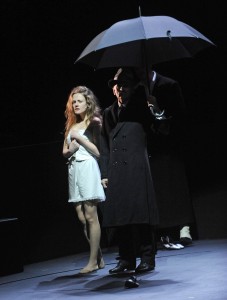 I wish every director in Los Angeles could see In Paris on The Broad Stage. The devotion to craft in the service of concept is exemplary. Here is a director with vision, and a company capable of articulating that vision (the Krymov Laboratory). This is what it looks like to have an idea and to execute it. Is it the best show I’ve ever seen? No; it does everything it wishes to do, but its aspirations are too slight. One of my favorites? No; it’s occasionally a little cute for my taste. But this is theater with a knowledge of itself and its capacity to explore the human condition. To see such a thing – among so many brainless pursuits of trite realism – is to breathe fresh air again in the midst of theatrical smog.
I wish every director in Los Angeles could see In Paris on The Broad Stage. The devotion to craft in the service of concept is exemplary. Here is a director with vision, and a company capable of articulating that vision (the Krymov Laboratory). This is what it looks like to have an idea and to execute it. Is it the best show I’ve ever seen? No; it does everything it wishes to do, but its aspirations are too slight. One of my favorites? No; it’s occasionally a little cute for my taste. But this is theater with a knowledge of itself and its capacity to explore the human condition. To see such a thing – among so many brainless pursuits of trite realism – is to breathe fresh air again in the midst of theatrical smog.
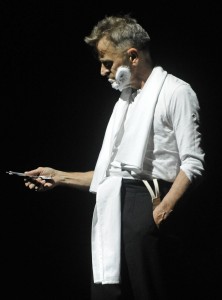 It would be stupid to describe a show this intangible in any detail. Here’s a single instance of its magic: a restaurant patron is so entranced by his server that he stands with his table and chair in his hands through three separate trips to the restaurant. Now, try to imagine such a thing happening on a stage at your favorite theater company. If you can’t, get a new favorite theater company, because theatricality is its own reward, and a lack of it means a lack of everything you go to the theater for: intelligence, passion, and difference from ordinary life.
It would be stupid to describe a show this intangible in any detail. Here’s a single instance of its magic: a restaurant patron is so entranced by his server that he stands with his table and chair in his hands through three separate trips to the restaurant. Now, try to imagine such a thing happening on a stage at your favorite theater company. If you can’t, get a new favorite theater company, because theatricality is its own reward, and a lack of it means a lack of everything you go to the theater for: intelligence, passion, and difference from ordinary life.
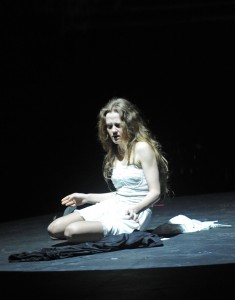 This production, on a steeply raked turntable stage, uses as scenery oversized, interlocking postcards to form cafes, automobiles, and various aspects of a city both attractive and forbidding. The costumes serve breathtaking double and triple duties: a dress turns into a slip and then a burka; a camisole, at the pull of a ribbon, drops into a full-length evening gown (both costume and set design by Maria Tregubova). Damir Ismagilov’s lighting tells the story and informs the themes as well as the talented actors do; Tei Blow’s video projections playfully interpolate the English supertitles directly into the action (the spoken dialogue is in French and Russian).
This production, on a steeply raked turntable stage, uses as scenery oversized, interlocking postcards to form cafes, automobiles, and various aspects of a city both attractive and forbidding. The costumes serve breathtaking double and triple duties: a dress turns into a slip and then a burka; a camisole, at the pull of a ribbon, drops into a full-length evening gown (both costume and set design by Maria Tregubova). Damir Ismagilov’s lighting tells the story and informs the themes as well as the talented actors do; Tei Blow’s video projections playfully interpolate the English supertitles directly into the action (the spoken dialogue is in French and Russian).
What seems special about these designs is that they’re organic to the piece. What’s special about the designers themselves is that they’re thinking of the whole show – not just their little fiefdoms but the larger kingdom. And you know what’s so impossible about a Los Angeles theater company coming up with and pulling off a concept like this? Nothing. This show isn’t particularly expensive in terms of money. In terms of talent, however, it’s worth a fortune.
photos by Angela Weiss/WireImage
In Paris
Baryshnikov Arts Center/Dmitry Krymov Laboratory at the Broad Stage in Santa Monica (Los Angeles Theater)
Scheduled to end on April 21, 2012
for tickets, visit http://www.TheBroadStage.com
then plays at Berkeley Rep from April 25 through May 13
for tickets, visit http://www.berkeleyrep.org/season/1112/5751.asp
